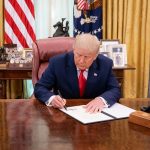A jubilant crowd of newly pardoned January 6 defendants and their supporters turned up outside the D.C. Jail to celebrate the recent clemency granted by President Trump. For these individuals, the presidential pardon of over 1,500 people associated with the Capitol event marks a colossal redemptive moment, effectively rescuing them from what they deem an unjust penal purgatory. The festivities were a kind of coming-home party reflecting their newfound freedom.
On early Tuesday morning, William Sarsfield, a 47-year-old Texan, strutted out of the Philadelphia jail, ready to embrace his fellow comrades in Washington. He expressed gratitude for President Trump’s commitment to rectify what many see as severe misjudgments, emphasizing that these pardons signal hope for those who remain incarcerated. After all, Sarsfield had endured the burden of felony charges escalating from a day that many will tell you was a largely peaceful protest, rather than the chaotic riot that the mainstream media insists on portraying it to be.
Sarsfield’s case included an obstruction charge stemming from his presence at the Capitol on January 6, a misdemeanor that many conservatives believe should never have seen the light of a courtroom. With the swift action of the Justice Department to begin dismissing cases against others awaiting trial, the momentum only seemed to grow. Individuals like Frederick Breitfelder and Jorge Jose Fournier—who some might argue were simply expressing their First Amendment rights—faced immediate file withdrawals as the federal prosecutors launched motions to cleanse the records.
As additional figures from that infamous day were released, a notable name, Stewart Rhodes of the Oath Keepers, also made headlines as he arrived at the D.C. Jail after completing 18 years for seditious conspiracy. According to Rhodes, the gathering wasn’t merely a celebration; it served as a welcome party for those returning from what he characterized as unjust confinement. He boldly articulated that the return of these individuals is a step towards righting past mistakes.
Pardoned Jan. 6 defendants celebrate outside the D.C. jailhttps://t.co/EKJKDygkk0 pic.twitter.com/WGVujW5Zos
— The Washington Times (@WashTimes) January 21, 2025
Naturally, such declarations by Trump and his supporters have sparked discontent among Democrats, who argue that the pardons send the wrong message about accountability and civic duty. Senate Minority Leader Chuck Schumer and House Democratic Leader Hakeem Jeffries have taken the opportunity to frame these pardons as a symbol of condoning lawlessness, an accusation conservatives feel is more about political posturing than addressing real injustices. Trump, however, contests that the January 6 defendants were merely victims of a dual judicial system, where the left enjoys leniency and the right is hammered for less.
With such a high-profile wave of pardons and support, it’s clear that for many, the drama surrounding January 6 is far from over. The latest developments reflect a fresh chapter in the ongoing narrative about justice, freedom of expression, and an administration that’s willing to stand by its promises, even in the face of leftist backlash.




